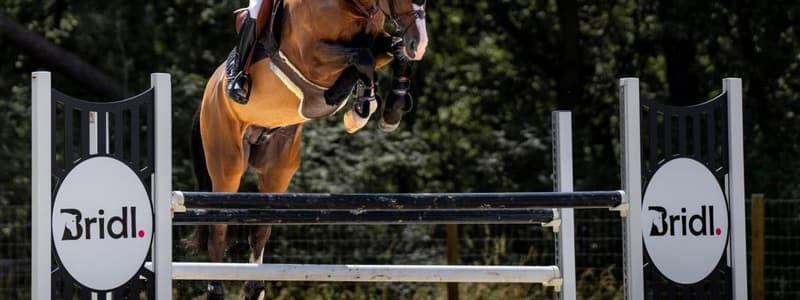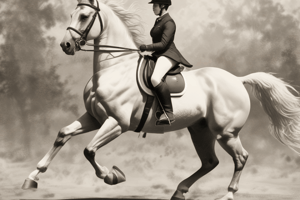Podcast
Questions and Answers
What is the primary objective of understanding the client's specific goals?
What is the primary objective of understanding the client's specific goals?
- To advise on the horse's marketability and future prospects
- To assess the horse's current level of showjumping capability
- To discuss the horse's potential for advancement in competition
- To select horses that align with the client's goals for optimal satisfaction (correct)
What is evaluated when assessing a horse's potential for advancement?
What is evaluated when assessing a horse's potential for advancement?
- The horse's athleticism, coachability, and training (correct)
- The horse's competition history and results
- The horse's lineage, conformation, and market value
- The horse's training background and past trainers
Why is it important to evaluate a horse's training level?
Why is it important to evaluate a horse's training level?
- To assess the horse's adaptability to further training (correct)
- To determine the horse's breed
- To identify potential health issues
- To determine the horse's market value
What is the purpose of a thorough vet check?
What is the purpose of a thorough vet check?
What is the main factor in selecting a horse that aligns with a client's goals?
What is the main factor in selecting a horse that aligns with a client's goals?
Study Notes
Characteristics of Horses
- Age: Younger horses offer potential for growth and training, while older horses provide more experience and stability.
- Temperament: Matching the horse's temperament with the rider's skill level and personality is crucial, with calm and steady horses suitable for beginners and spirited horses for experienced riders.
Conformation
- Physical build and structure impact performance and longevity.
- Key points to consider: straight legs, good muscle development, and balanced proportions.
Budget and Price Ranges
- Understanding the client's budget constraints and offering suitable options is essential.
- Discussing financing options and payment plans may be necessary.
- The cost vs. value of investing in a quality horse should be considered, with factors justifying higher prices including pedigree, training, and performance record.
Rideability and Suitability
- Assessing the horse's suitability for the client's riding skill level is crucial.
- Trial rides and client feedback are important for ensuring a good match.
- The horse's training level should be evaluated and matched with the rider's expectations and goals.
Vet Checks and Medical History
- Comprehensive vet checks are essential before finalizing the purchase.
- Common checks include X-rays, blood tests, and physical examinations.
- Providing full disclosure of the horse's medical history and any known issues is crucial.
- Discussing potential future medical needs and costs is important.
Goals and Objectives
- Matching the horse to the client's specific goals (competition, leisure, investment) is essential.
- Understanding the client's short-term vs. long-term goals helps in selecting the right horse.
- Advising on horses that can grow and develop with the rider's goals is important.
Showjumping
- Assessing the horse's current level of showjumping capability is crucial.
- Providing performance records and competition results is important.
- Evaluating the horse's potential to progress to higher levels of competition should be considered.
- The horse's training, athleticism, and coachability should be assessed.
Quality and Experience
- Sharing the horse's competition history and results is important.
- Highlighting achievements and notable performances should be considered.
- Detailing the horse's training regimen and past trainers is essential.
- Assessing the horse's adaptability to new training methods is important.
- Evaluating the horse's potential for improvement and success should be considered.
- Discussing the horse's lineage, conformation, and current training is important.
- The horse's potential return on investment through competition success or resale should be considered.
- Advising on the horse's marketability and future prospects is important.
Studying That Suits You
Use AI to generate personalized quizzes and flashcards to suit your learning preferences.



